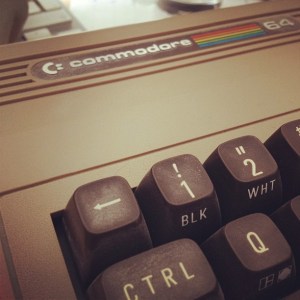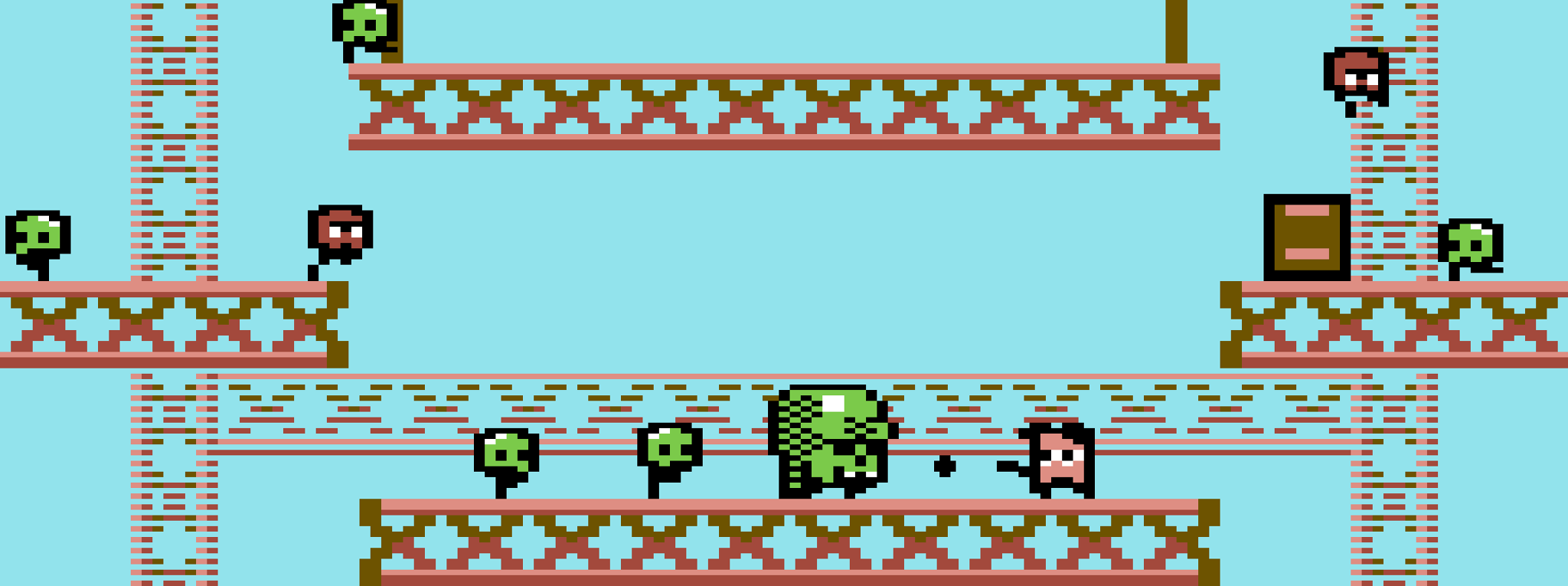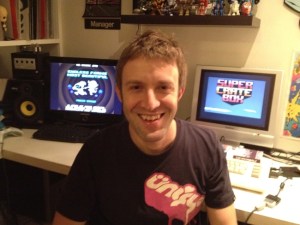A fresh approach to retro gaming
C64anabalt is just a small window on the world of RGCD. Monkman and his team are creating a wide range of titles that are proving either welcome or perplexing, depending on who you ask.
“The hardcore C64 community is essentially divided into those who only play ‘classic’ retro games and those who embrace both the new and old with an open mind,” says Monkman. “We’re popular with the latter, but not so much with the old school, mainly because we’ve been trying to focus on crossing over modern game designs rather than sticking with a tried-and-tested standard formula. Quite simply, some C64 gamers just don’t ‘get’ some of our games – Super Bread Box and Get ‘Em DX in particular.”
Super Bread Box is a great example of RGCD’s approach. Originally an indie sensation on PC, Super Crate Box, RGCD managed to get approval from developer Vlambeer for an official C64 conversion. Paulko64 is again handling coding duties, and the game is set to release later this year. The reworked title references the bulky design of the original C64, often referred to as a “Bread Box.” Viewed side-by-side, Super Bread Box (C64) stands proudly next to Super Crate Box (PC).
Shipping worldwide, one cart at a time
The demand for new titles is greater now than at any time since 1994, when the C64 ceased production. “There’s certainly a greater number of active game coders now than 10 years ago,” says Monkman. “Mainly due to increased interest in the retro scene, game development competitions, and people like us offering to sell physical copies of new releases.”
As for RGCD’s cartridge releases, Monkman says that sales tend to sit at around 50 units. “It’s a bit hit or miss,” he says, “and we’ve recently lost a few of our ‘collector-only’ customers, because we typically don’t make limited runs of games. They are made in small batches as and when required.
“We can make batches as small as one to 10 cartridges at a time,” he says, “because Tim [Harris] assembles each and every game cartridge by hand, and all the printing and so on is D.I.Y. Tim and I are both based in the U.K., so it’s relatively cheap to mail stuff back and forth as well during prototyping.”
This approach means that the more popular titles continue to be produced and sold on an order-by-order basis. C64anabalt has now sold over 200 units, and Soulless over 150, with both titles still available to purchase.
In total, RGCD has mailed out 650 Commodore 64 titles since April last year to countries including Japan, the United Arab Emirates, and Tasmania. But Germany is home to the most active C64 scene, with around 80 percent of sales shipping there.
The Commodore 64 gamer
“Nostalgia plays a large part in why I still play games on my Commodore 64,” says Eric Nelson, an avid C64 player who regularly shares his gaming adventures on Google+. “But more than that, the 64 is a very unique system that no other console or home computer replicated. The proof being the huge number of people who still program, use, and collect Commodore hardware and software.
 “Physical copies are important to me. I think it’s very cool that boxes, disk covers, and cartridges are still produced,” he says. “I also think downloadable, digital copies are important, too, for ease of play. Keeping old 1541 floppy drives tuned-up can be a challenge. Using devices like Ultimate 1541 II [floppy disk and cartridge emulator] makes loading games faster and more reliable than back in the day. I try to get key titles in both formats whenever possible.”
“Physical copies are important to me. I think it’s very cool that boxes, disk covers, and cartridges are still produced,” he says. “I also think downloadable, digital copies are important, too, for ease of play. Keeping old 1541 floppy drives tuned-up can be a challenge. Using devices like Ultimate 1541 II [floppy disk and cartridge emulator] makes loading games faster and more reliable than back in the day. I try to get key titles in both formats whenever possible.”
And how do these modern releases hold up against the original C64 classics? “I’ve thought a lot about this question,” says Nelson. “While the classics are amazing, I think the level of programming going into games has never been higher. Some of the titles coming out these days would have blown my mind back in the day. The games may not be as large as they were, but they utilize clever programming tricks that push the 64 to its limits.
“Soulless, Fairy Well, Assembloids, Super Bread Box, Knight N’ Grail, Trance Sector: These are all great, newer titles that have been very impressive.”
The Commodore 64 gamer
Monkman believes that the capability to emulate C64 games on PC is the one thing that has really helped modern-day developers. “It’s the major advantage that the classic era coders never had,” he says. “A direct result of this is that development is faster. Sharing techniques and knowledge has [also] lead to greater compatibility between hardware variations and getting more out of the machine.
“I’d like to believe that we’re on a par at least with the budget titles of the day with our 16KB games, and our 64KB releases are of the same standard as a classic, full-price game. But it’s difficult to not be biased with something you’ve been so heavily involved in. The reviews and feedback we’ve received has generally been positive, though.”
 Despite that “there’s not a lot of money in retro publishing,” Monkman continues to devote his spare time to the business. RGCD is much more than a hobbyist endeavour now, and the small profits the company makes get shared equally between RGCD, the coder, the artist, and the musician.
Despite that “there’s not a lot of money in retro publishing,” Monkman continues to devote his spare time to the business. RGCD is much more than a hobbyist endeavour now, and the small profits the company makes get shared equally between RGCD, the coder, the artist, and the musician.
As for the future, Monkman is hopeful that the new RGCD online store will mean he spends less time dealing with email about combined shipping and more time driving the business. “It’ll also allow us to support/host downloads,” he says, “and link directly to Psytronik’s store for games that we’ve joint published. It’s taken a lot of time and investment, but will certainly be worth the wait.”
There are other plans, such as publishing on modern hardware, on the horizon, but for now he’ll keep doing what he does, simply because “it’s fun to publish new 8-bit games in the 21st century.”
[Main image via axeldeviaje/Flickr, advertising image via blakespot/Flickr, featured image Choubistar/Flickr, ZZAP!64 image via Phillie Casablanca/Flickr, all other images via RGCD]
VentureBeat's mission is to be a digital town square for technical decision-makers to gain knowledge about transformative enterprise technology and transact. Learn More


















